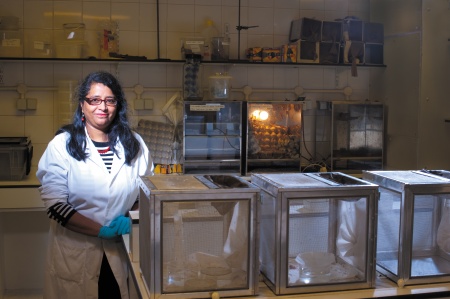Thursday, 28 July 2022
Scientists at the University of Nottingham have made a major breakthrough in understanding how malaria parasites divide and transmit the disease, which could be a major step forwards in helping to prevent one of the biggest killer infections in the world.
Malaria is still the deadliest parasitic disease worldwide, with approximately 241 million cases and over half a million deaths annually. It is caused by a single-celled parasite called Plasmodium, which is transmitted between people by the female Anopheles mosquito when they bite to take blood.
In this new study, published in PLOS Biology, scientists have uncovered the crucial roles of a group of motor proteins named kinesins during the parasite life cycle.
 Different locations of kinesins in male cells of malaria parasite
Different locations of kinesins in male cells of malaria parasite
The research, led by Rita Tewari, Professor of Parasite Cell Biology in the University’s School of Life Sciences, has shown the significance of kinesins in basic cellular processes needed for malaria parasite development, multiplication and invasion, most importantly within the mosquitoes that transmit the parasite.
Kinesins are molecular motor proteins that use energy from the hydrolysis of adenosine triphosphate (ATP - a universal store of energy in all cells), and function in various cellular processes. They are involved in transport, cell division, cell polarity and cell motility.
This latest study showed that of the nine kinesins present in the parasite genome, eight are required for the various functions of cell proliferation to cell movement in the mosquito host which was very surprising.
Researchers at the University of Nottingham have studied the location and function of all kinesins in live parasite cells at various stages of development, both in the mosquitoes which transmit the disease, and in the host where it causes disease. These proteins are important potential drug targets, hence the importance of this study in the search for new intervention targets.
Professor Tewari said: “This is an important genome-wide study and an essential resource for studying the various morphologically distinct parasite cells involved in parasite transmission. It shows how these important motors proteins are involved in forming molecular tracks for movement, multiplication, and transmission.”
 Professor Rita Tewari
Professor Rita Tewari
Dr Zeeshan, who is the first author of the paper, said: “This is a comprehensive study on parasite molecular motors. It was very challenging to capture the dynamics of these proteins in live parasite cells within mosquitoes. Most importantly, we could study the formation of the male gamete (sperm), which involves a rapid multiplication process that completes within 10-12 min after the female mosquito has ingested blood from an infected host. Multiple kinesins are involved in efficient production of male gametes and deletion of kinesin genes halts parasite transmission, a discovery that can be explored further for drug discovery.
“In addition, we found one motor protein, kinesin-13, which is essential for parasite multiplication in all stages of the life cycle.”
The study was carried out in collaboration with several scientists; Tony Holder at the Francis Crick Institute, London; Prof Carolyn Moores at Birbeck College; Profs Sue Vaughan and David Ferguson at Oxford Brookes; Prof Mathieu Brochet and Ravish Raspa at the University of Geneva; and Prof Karine Le Roch and Steven Abel at the University of California. This study demonstrates the power of multidisciplinary science and how networking and collaboration lead greater global understanding in science. The work was funded by BBSRC, MRC, CRUK, Wellcome Trust, NIH and NIAID.
Story credits
More information is available from Professor Rita Tewari at rita.tewari@nottingham.ac.uk
Notes to editors:
About the University of Nottingham
Ranked 24 in Europe and 15th in the UK by the QS World University Rankings: Europe 2024, the University of Nottingham is a founding member of Russell Group of research-intensive universities. Studying at the University of Nottingham is a life-changing experience, and we pride ourselves on unlocking the potential of our students. We have a pioneering spirit, expressed in the vision of our founder Sir Jesse Boot, which has seen us lead the way in establishing campuses in China and Malaysia - part of a globally connected network of education, research and industrial engagement.
Nottingham was crowned Sports University of the Year by The Times and Sunday Times Good University Guide 2024 – the third time it has been given the honour since 2018 – and by the Daily Mail University Guide 2024.
The university is among the best universities in the UK for the strength of our research, positioned seventh for research power in the UK according to REF 2021. The birthplace of discoveries such as MRI and ibuprofen, our innovations transform lives and tackle global problems such as sustainable food supplies, ending modern slavery, developing greener transport, and reducing reliance on fossil fuels.
The university is a major employer and industry partner - locally and globally - and our graduates are the third most targeted by the UK's top employers, according to The Graduate Market in 2024 report by High Fliers Research.
We lead the Universities for Nottingham initiative, in partnership with Nottingham Trent University, a pioneering collaboration between the city’s two world-class institutions to improve levels of prosperity, opportunity, sustainability, health and wellbeing for residents in the city and region we are proud to call home.
More news…